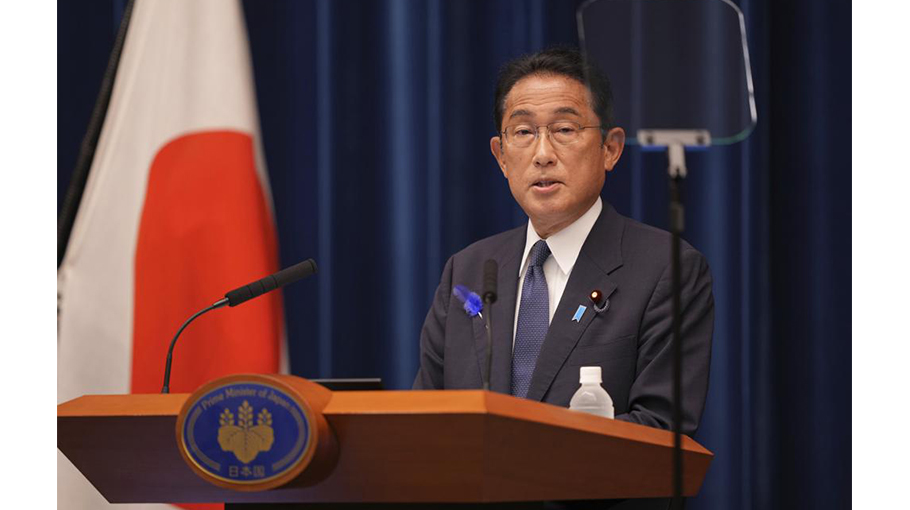Japan PM blames police for death of former leader Shinzo Abe

Japanese Prime Minister Fumio Kishida on Thursday blamed inadequate police protection for the death of former leader Shinzo Abe, who was shot while giving an outdoor campaign speech.
Abe, one of Japan’s most influential politicians, was assassinated last Friday in western Japan, shocking a nation known for its low crime rate. Photos and videos of the shooting show the gunman was able to come close to Abe.
Officials at the National Public Safety Commission and National Police Agency are investigating what went wrong and will come up with measures, Kishida said.
“I urge them to fix what needs to be fixed, while also studying examples in other countries,” he said.
Kishida also announced plans to hold a state funeral for Abe later this year, noting his contributions at home and in boosting Japan’s security alliance with the United States.
A smaller funeral ceremony was held at a temple in Tokyo on Tuesday for Abe, whose nationalistic views drove the governing party’s conservative policies.
A suspect was arrested immediately after Abe was shot on Friday and is being held for questioning. Police and media reports say he told investigators that a rumored link between Abe and a religious group the suspect hated was the reason he killed the former prime minister.
The suspect, 41-year-old Tetsuya Yamagami, served briefly in Japan’s navy. He was reportedly upset because his mother made large donations to the Unification Church that bankrupted the family.
The assassination of Abe has shed a light on links between the governing Liberal Democratic Party and the Unification Church, which is known for its conservative and anti-communist beliefs and its mass weddings.
The Japan branch of the South Korean-based church confirmed on Monday that Yamagami’s mother was a member and that Abe was not. Abe has appeared in video messages to groups affiliated with the church.
Earlier, Abe’s long-time ally and mentor, Finance Minister Taro Aso, described him as “the most talented politician in postwar Japan who raised Japan’s international profile.”
About 1,000 people, including Prime Minister Fumio Kishida, governing party leaders and foreign officials, attended the funeral at the temple.
Shinzo Abe was born into a prominent political family and became Japan’s longest-serving prime minister. He was credited with instilling political and economic stability though he angered Japan’s neighbors South Korea and China — along with many Japanese — with his nationalistic rhetoric and calls to revise the country’s pacifist constitution.
Abe, 67, was shot to death Friday at a campaign event in western Japan. Here is a look at key moments in his life and career:
— Sept. 21, 1954: Abe is born in Tokyo, the son of Shintaro Abe, who served as Japan’s foreign minister, and grandson of Nobusuke Kishi, a former prime minister.
— 1977: Graduates from Seikei University in Tokyo with a degree in political science, after which he moves to the U.S. to study public policy at the University of Southern California for three semesters.
— 1979: Begins working at Kobe Steel as the firm was expanding its presence abroad.
— 1982: Leaves the company to pursue new positions at the Foreign Ministry and with the ruling Liberal Democratic Party.
— 1993: First elected as an LDP legislator representing the southwestern prefecture of Yamaguchi. Abe, already viewed as a conservative, becomes a member of and eventually leads the party’s largest faction, Seiwakai, that had once been headed by his father, who died in 1991.
— 2005: Abe is appointed chief cabinet secretary under Prime Minister Junichiro Koizumi, during which he leads negotiations to return Japanese citizens abducted to North Korea. The same year, he is elected head of the LDP, putting him in line to take over as prime minister.
— Sept. 26, 2006: Abe becomes Japan’s prime minister for the first time, overseeing economic reforms while taking a hard line on North Korea and seeking to engage with South Korea and China.
— 2007: Following electoral defeats that saw the LDP lose control of the legislature for the first time in 52 years, Abe resigns as prime minister, citing health reasons. Abe has been suffering from ulcerative colitis but was able to control it with medication.
— 2012: After again being elected LDP president, Abe becomes prime minister for the second time.
— 2013: Seeking to boost growth, Abe launches his “Abenomics” policies featuring easy lending and structural reforms. Japan’s relations with China undergo a particularly rough patch but begin to improve after Abe meets with Chinese leader Xi Jinping at the APEC summit in Beijing.
— 2014-2020: Reelected LDP leader, he serves two additional terms as prime minister for a total of four, during which he develops close relations with then-president Donald Trump, holding summits and golfing together.
— Aug. 28, 2020: Announces he will step down as prime minister, again citing health reasons, after his ulcerative colitis flares up again. By that point, Abe had already become Japan’s longest-serving prime minister.
— Nov. 30, 2021: Despite leaving office, Abe shows he can still rile up Beijing with comments on Taiwan, the self-governing island China claims as its own territory and threatens to attack. In a speech, Abe warned that “military adventure would lead to economic suicide.”
— July 8, 2022: Abe is fatally shot while giving a speech at a campaign event in Nara by a gunman using a homemade weapon.



